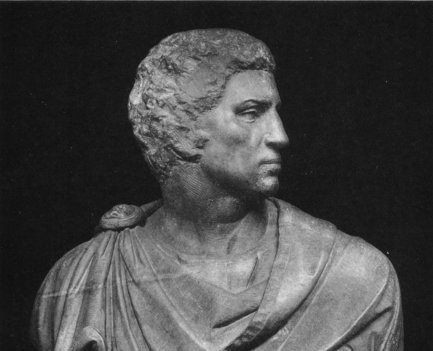Most people know the story of the assassination of Julius Caesar on the 15 March 44 B.C.E. Shakespeare made the event famous in his play Julius Caesar, and has left many saying “Beware the ides of March.”1 However, the assassination of Caesar may never have happened if Marcus Brutus had not agreed with Cassius. To understand the complete story of the assassination of Caesar, one has to understand the role that Marcus Brutus played.
Marcus Junius Brutus the Younger, better known as Brutus, is descended from Lucius Junius Brutus, founder and first consul of the Roman Republic in 509 B.C.E. The political future of Rome was so important to Lucius that he ordered his oldest two sons put to death for their desire to restore Rome to a monarchy. Lucius spared the life of his youngest son and it is through him that Marcus was born.2 Brutus’ own father, Marcus Brutus, was killed by Pompey the Great during a revolt.3
So who was this Brutus? He was a typical Roman, who received the traditional education of the Roman elite and was greatly influenced by the writings of Plato. Upon completion of his education, Brutus was given a position in the government.4 In both his marriage and in his public life, Brutus was expected to align with Caesar, but instead, he made his peace with Pompey the Great, eventually siding with him during the Roman Civil War in 49-48 B.C.E.5
Brutus was captured at the Battle of Pharsalus and spared by Caesar, causing Brutus to switch sides to Caesar.6 It is important to note at this time that Caesar had a special fondness for Brutus, believing Brutus was his son, born out of a love affair Caesar had with Servilia, Brutus’ mother. Out of this fondness, Caesar had instructed his commanders not to harm Brutus should he be captured in battle.7 Caesar pardoned Brutus for his role during the Civil War and gave him a high ranking government job. Brutus in turn convinced Caesar to give a government position to Cassius, Brutus’ brother-in-law.8
It was during this time following the Civil War that Caesar declared himself dictator of Rome, as allowed by the constitution during times of emergency, but not to last more than six months. Caesar wore the robe, crown, and scepter of the general, and called himself imperator. As leader of Rome, he had complete control over the armies. Many senators felt their power being threatened and feared that Caesar would soon appoint himself King of Rome.9
Cassius did not like Caesar, and soon began to plot to end his reign of power. He attempted to recruit his friends and fellow senators, but they refused to go along with Cassius unless he could convince Brutus to join them.10 Brutus had such an honorable reputation that his participation was crucial to the success of the cause. Brutus agreed to participate because of his family history in creating and protecting the Republic at its founding and the ensuing Roman tradition of opposing all forms of tyranny. Both Brutus and Cassius believed that once Caesar was dead, Rome would naturally return to the traditional Republic.11
The group of conspirators had heard that Caesar would be attending a senate meeting on March 15, and they planned the assassination for that day. They knew that it would not look suspicious, since they all had to attend the meeting of the senate and they believed that the Ides of March was a blessed day to make their move, since it was a religious holiday in Rome. Ironically, there was a statue of Pompey the Great, the leader Caesar had killed after the Civil War ended, in the portico where the assassination was to take place as soon as Caesar arrived. The conspirators believed it to be the perfect date and place to make their attempt to restore the Republic.12

However, on the planned day, Caesar was late and the conspirators became worried. When Caesar finally arrived, the senators surrounded him as he took his seat, and the attack began. All the senators attacked at once, creating a frenzy in which many of the them were stabbed in the process; even Brutus was stabbed in the hand. When that attack was over, Caesar was dead.13 The next day, Antonius (also known as Mark Antony), the sole remaining consul, granted all the conspirators amnesty, and distributed provinces to them as rewards. Brutus was given the province of Crete and moved there with his family where he continued to work for the government.14

Meanwhile, Octavian, Caesar’s nephew and heir, was brought to the capital to take Caesar’s place as leader of Rome. Octavian was angry that Antonius had pardoned the conspirators and when the common people of Rome learned of the assassination of Caesar, they too were angry that none of the conspirators had been punished. This rift between the people and the leaders began to cause a rift between Octavian and Antonius. Soon the leaders of Rome began to align themselves between Octavian and Antonius, and another war civil war began. Known as the Post-Caesarian Civil War, this war was between Octavian and his supporters and Antonius and his supporters in order to end the rift that had been growing. It did not take long for Antonius to be defeated by Octavian, resulting in a truce that joined their armies together. This is also when the Second Triumvirate was formed in 43 B.C.E. between Octavian, Antonius, and Marcus Lepidus allowing the three of them to rule Rome together.15
The next civil war in Rome, known as the Liberators’ Civil War, was fought between the Second Triumvirate and the liberators (those who assassinated Caesar and their supporters). Brutus and Cassius were the main targets of the Roman army and separately rallied troops to fight with them. Brutus, according to Plutarch, “was esteemed by the many for his virtues, but loved by his friends, admired by the nobles, and not hated even by his enemies.”16 Because of this, many people in Rome had faith in his motives and believed that while the other senators had murdered Caesar out of hatred and spite for his power, Brutus had participated because he truly wanted to end the tyranny that he believed Caesar had created in Roman government.17 Unable to defeat Octavian’s army, Cassius, fearing being captured, committed suicide.18
Unfortunately for Brutus, his army was not able to defeat the Roman army either, and he admitted defeat at the Battle of Philippi in 42 B.C.E. Also fearing being captured, Brutus fled to the hills with a good friend and fellow soldier. It was there that Brutus convinced his friend to take his sword and hold it upright, Brutus then fell upon his sword, killing himself. Antonius still held much respect for Brutus and had his body wrapped up in the finest purple cloth for the cremation. After he was cremated, his ashes were sent to his mother, since his wife was already dead, another suicide.19
Even after his death, Brutus served as a role model for senators and his story reminded emperors that they served at their own peril if they ignored the senate.20 Brutus did not end tyranny or civil war, with many battles leading to the loss of the Roman Republic. According to Shakespeare, Brutus acted out of honor to protect his home from a tyrant. Dante placed Brutus in the worst level of Hell in the mouth of Satan next to Judas Iscariot.21 Either way one remembers Brutus, one must remember the conspiracy would never have gotten anywhere without the participation of Brutus.
- William Shakespeare, Julius Caesar (Boston: Ginn and Company, 1908), Kindle edition, Act 1 scene 2. ↵
- Salem Press Biographical Encyclopedia, January 2017, s.v. “Marcus Junius Brutus,” by Michael Witsoki. ↵
- Salem Press Encyclopedia, January 2016, s.v. “Brutus,” by Richard Westall. ↵
- Salem Press Biographical Encyclopedia, January 2017, s.v. “Marcus Junius Brutus,” by Michael Witsoki. ↵
- Salem Press Encyclopedia, January 2016, s.v. “Brutus,” by Richard Westall. ↵
- Salem Press Encyclopedia, January 2016, s.v. “Brutus,” by Richard Westall. ↵
- Plutarch, Plutarch’s Lives Volume IV (London: George Bell & Sons, 1892), 402, Project Gutenberg, https://www.gutenberg.org/files/44315/44315-h/44315-h.htm#Page_398 (accessed October 23, 2017). ↵
- Plutarch, Plutarch’s Lives Volume IV (London: George Bell & Sons, 1892), 404-405, Project Gutenberg, https://www.gutenberg.org/files/44315/44315-h/44315-h.htm#Page_398 (accessed October 23, 2017). ↵
- Funk & Wagnalls New World Encyclopedia, 2016, s.v. “Caesar, Gaius Julius.” ↵
- Plutarch, Plutarch’s Lives Volume IV (London: George Bell & Sons, 1892), 407-408, Project Gutenberg, https://www.gutenberg.org/files/44315/44315-h/44315-h.htm#Page_398 (accessed October 23, 2017). ↵
- Salem Press Biographical Encyclopedia, January 2017, s.v. “Marcus Junius Brutus,” by Michael Witsoki ↵
- Plutarch, Plutarch’s Lives Volume IV (London: George Bell & Sons, 1892), 410-412, Project Gutenberg, https://www.gutenberg.org/files/44315/44315-h/44315-h.htm#Page_398 (accessed October 23, 2017). ↵
- Plutarch, Plutarch’s Lives Volume IV (London: George Bell & Sons, 1892), 413, Project Gutenberg, https://www.gutenberg.org/files/44315/44315-h/44315-h.htm#Page_398 (accessed October 23, 2017). ↵
- Plutarch, Plutarch’s Lives Volume IV (London: George Bell & Sons, 1892), 416, Project Gutenberg, https://www.gutenberg.org/files/44315/44315-h/44315-h.htm#Page_398 (accessed October 23, 2017). ↵
- Plutarch, Plutarch’s Lives Volume IV (London: George Bell & Sons, 1892), 418-419, Project Gutenberg, https://www.gutenberg.org/files/44315/44315-h/44315-h.htm#Page_398 (accessed October 23, 2017). ↵
- Plutarch, Plutarch’s Lives Volume IV (London: George Bell & Sons, 1892), 425, Project Gutenberg, https://www.gutenberg.org/files/44315/44315-h/44315-h.htm#Page_398 (accessed October 23, 2017). ↵
- Plutarch, Plutarch’s Lives Volume IV (London: George Bell & Sons, 1892), 425, Project Gutenberg, https://www.gutenberg.org/files/44315/44315-h/44315-h.htm#Page_398 (accessed October 23, 2017). ↵
- Plutarch, Plutarch’s Lives Volume IV (London: George Bell & Sons, 1892), 443-446, Project Gutenberg, https://www.gutenberg.org/files/44315/44315-h/44315-h.htm#Page_398 (accessed October 23, 2017). ↵
- Plutarch, Plutarch’s Lives Volume IV (London: George Bell & Sons, 1892), 449-453, Project Gutenberg, https://www.gutenberg.org/files/44315/44315-h/44315-h.htm#Page_398 (accessed October 23, 2017). ↵
- Salem Press Encyclopedia, January 2016, s.v. “Brutus,” by Richard Westall. ↵
- Kim Zarins, “‘Et tu, Brute?'” Calliope 17, no. 4 (December 2006): 42-44. ↵



83 comments
Santos Mencio
An excellent article about Brutus and his involvement in the assassination of one of history’s greatest. It was interesting to learn that Ceasar’s kindness to Brutus allowed Cassius to ammass enough power and influence to attempt an assassination. The people’s stalwart belief in the goodness of Brutus is astounding, even after participating in the assassination of Ceasar and joining the opposing side of the war between the Liberators and the Second Triumvirate they believed that he was genuinely trying to do what was best for Rome.
Desiree Arizmendez
Coming into this story, I had zero idea who Marcus Brutus was. The only word I knew from his name was Brutus. Reading his backstory was very interesting. He seemed to come out lucky out of his siblings, being able to live while your brothers got killed. I also did not know he had any part in the death of Julius Caesar, and I would have never known if this article was not easy to read. The way you wrote this article was incredible. I was able to keep focus on what was being written. It is very incredible how Marcus was trying to keep his people from what Julius was creating.
Hailey Lechuga
This was a truly fascinating article, considering that it is true the majority of people know about the assassination of Julius Caesar, but not of the story behind one of the most influential contributor to the matter, the story of Marcus Brutus. It is most interesting to observe Marcus’ loyalty to his familiar duty to protect the Republic from tyranny. Who knows, if Marcus would have disagreed to participate in this plot, whether Caesar would have continued to live and eventually establish a tyranny, and what the next hundreds of years would look like for the Romans.
Mohammed Hani Shaik
One of the greatest events in history I believe had to do with Marcus Brutus so it’s only justifiable that we have such a splendid article highlighting his backstory and providing insight into what may have caused him to betray one who spared him and lifted him to higher power in Rome. What intrigues me is how easily can one decide to kill a possible figure because of the state of the nation being to his dislike. I would also like to know how he lived on with this decision.
Faith Chapman
I am surprised that Caesar’s men or the senate did not find anything wrong with him completely sparing Brutus when he killed or imprisoned everybody else captured at that battle (or so I assume), but maybe Brutus already had a reputation of being virtuous and admirable, thus even back then he was not one to be hated by his enemies.
Maria Moreno
I haven’t invested much time in history books or articles but this article definitely caught my attention. I didn’t know of Marcus Brutus, even though he played a big role in Caesar’s murder attack. I understand his point of view were he had to be true to his family history but it is still tough to read about a betrayal, even after Caesar pardoned him and gave him a highly positioned job Brutus went behind his back. It makes me happy in a way though, to know how people can always choose the good side. I still don’t understand if people were so mad at caesar; enough to kill him, why would they want to get back at the people who killed him? maybe them being rewarded was a little too much, and I know we can’t changed what happened but I really hate that they committed suicide. I also liked the way you wrote this article, it was easy to comprehend and it kept me engaged.
Azariel Del Carmen
I have never heard of this guy at all, only the telling that Caesar’s Roman Senate went on to murder him for him becoming a tyrant. I find it odd and cool that this guy was let off for so much time from battle before his suicide, to people having to get him on their side to plot out a plan to take out someone.
His story from what he was born into and being the only spared person in his family by his own father all the way up to controlling Crete was very interesting and seeing how the public reacted and went on a war at them, served more as to how much people went to do stuff and pay it back with something else.
Vivian Urrutia
Marcus Brutus was more interested than what I thought he was. I knew how the assassination of Julius Caesar was like but never knew the real motives of Brutus, know I am interested to know if the other senators had some deeper reasons too. What shocked me the most is how Brutus father ordered to kill his both sons for their desire to restore Rome to a monarchy but he spared Brutus life like it was worth nothing. It is shocking how little they valued life because at the end they all ended up committing suicide. It was unfortunate to see how Brutus’ intentions were noble but didn’t succeed. Still, Marcus Brutus had a huge role in the history of Rome.
James Clark
I personally never knew that Brutus was spared in battle because Caesar thought he was a child out of an affair. This article brought to light many facts about Brutus that I never knew. Also, everyone thinks of Brutus as a traitor but he acted out of what he thought would be best for Rome in its entirety. To me, it seems as if Brutus tried to do the right thing but went about it the wrong way. He resembled what the Roman republic stood for as a person and it would’ve been more fitting if Brutus tried to fight against Caesar’s tyranny through the republic. Even if Brutus had to die at the hands of Caesar he would’ve died upholding what he as a person personified.
Marshall Durham
Marcus Brutus is most known for helping in the assassination of Julius Caesar The Great. He also led his people away from the tyranny that Julius Caesar was starting to create in Rome. Marcus Brutus is descended from Lucius Junius Brutus who was the leader of the Roman Republic in 509 B.C.E. He was also apart of the first council that was created in the Roman Republic. Marcus Brutus had joined the consiracy in hopes to gain back a republic. Julius Caesar had drifted off into a tyranny phase and was only looking for land. Although that was made Caesar great, it was not for the well being of Rome in Brutus’s eyes.